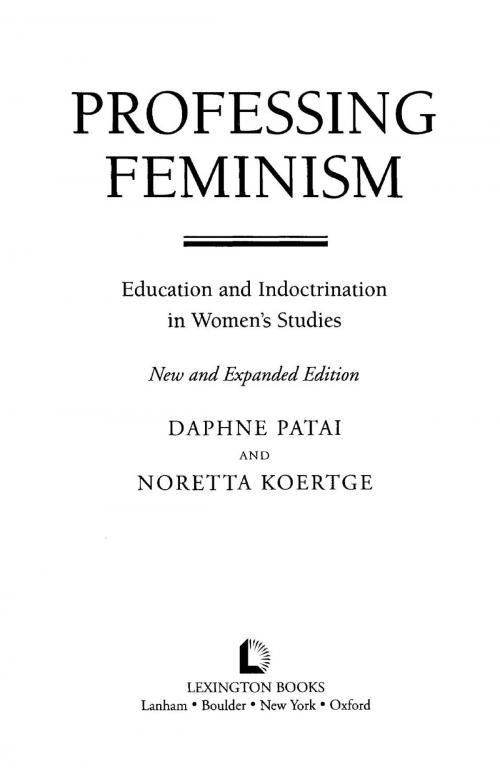Professing Feminism
Education and Indoctrination in Women's Studies
Nonfiction, Reference & Language, Education & Teaching, Higher Education| Author: | Daphne Patai, Noretta Koertge | ISBN: | 9780739159637 |
| Publisher: | Lexington Books | Publication: | February 4, 2003 |
| Imprint: | Lexington Books | Language: | English |
| Author: | Daphne Patai, Noretta Koertge |
| ISBN: | 9780739159637 |
| Publisher: | Lexington Books |
| Publication: | February 4, 2003 |
| Imprint: | Lexington Books |
| Language: | English |
Feminists have often called Women's Studies the 'academic arm of the women's movement.' But Daphne Patai and Noretta Koertge charge that the attempt to make Women's Studies serve a political agenda has led to deeply problematic results: dubious scholarship, pedagogical practices that resemble indoctrination more than education, and the alienation of countless potential supporters. In this new and expanded edition of their controversial 1994 book, the authors update their analysis of what's gone wrong with Women's Studies programs. Original chapters feature interviews with professors, students, and staffers who invested much time and effort in Women's Studies, and new chapters look primarily at documents recently generated from within Women's Studies itself. Through critiques of actual program mission statements, course descriptions, newsletters, and e-mail lists devoted to feminist pedagogy and Women's Studies, and, not least, the writings of well-known feminist scholars, Patai and Koertge provide a detailed and devastating examination of the routine practices found in feminist teaching and research.
Feminists have often called Women's Studies the 'academic arm of the women's movement.' But Daphne Patai and Noretta Koertge charge that the attempt to make Women's Studies serve a political agenda has led to deeply problematic results: dubious scholarship, pedagogical practices that resemble indoctrination more than education, and the alienation of countless potential supporters. In this new and expanded edition of their controversial 1994 book, the authors update their analysis of what's gone wrong with Women's Studies programs. Original chapters feature interviews with professors, students, and staffers who invested much time and effort in Women's Studies, and new chapters look primarily at documents recently generated from within Women's Studies itself. Through critiques of actual program mission statements, course descriptions, newsletters, and e-mail lists devoted to feminist pedagogy and Women's Studies, and, not least, the writings of well-known feminist scholars, Patai and Koertge provide a detailed and devastating examination of the routine practices found in feminist teaching and research.















